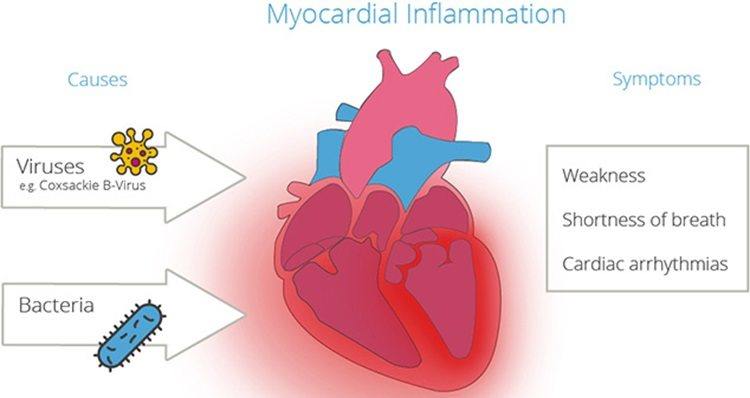Myocarditis is an inflammatory condition of the heart muscle (myocardium) that can vary in severity from mild to life-threatening. It is often caused by viral infections, but can also be triggered by bacterial infections, autoimmune diseases, toxins, and adverse reactions to medications. The progression and outcome of myocarditis can be unpredictable, making it crucial to understand the potential timelines and risks associated with this condition. This article will delve into the various factors that influence the prognosis of myocarditis and provide an in-depth analysis of how long it may take for the condition to become fatal.
Causes of Myocarditis
Myocarditis can be caused by various infectious and non-infectious agents. The most common causes include:
Viral Infections: Viruses such as coxsackievirus, adenovirus, influenza virus, and COVID-19 are frequently associated with myocarditis.
Bacterial Infections: Bacteria like Streptococcus, Staphylococcus, and Borrelia (Lyme disease) can lead to myocarditis.
Autoimmune Diseases: Conditions such as lupus, rheumatoid arthritis, and giant cell arteritis can result in autoimmune myocarditis.
Medications and Toxins: Certain drugs, chemotherapy agents, and toxins can cause myocardial inflammation.
SEE ALSO: 8 Diseases Are Easily Misdiagnosed as Myocarditis?
Symptoms of Myocarditis
The symptoms of myocarditis can range from mild to severe and may include:
- Chest pain
- Fatigue
- Shortness of breath
- Palpitations (irregular heartbeats)
- Swelling in the legs, ankles, and feet
- Lightheadedness or fainting
In severe cases, myocarditis can lead to heart failure, arrhythmias, or sudden cardiac death.
Prognosis And Fatality Risk
Acute vs. Chronic Myocarditis
Myocarditis can present in acute or chronic forms. Acute myocarditis develops suddenly and can resolve quickly, but it can also progress rapidly to severe complications. Chronic myocarditis, on the other hand, develops over a longer period and can lead to ongoing heart damage and heart failure.
Factors Influencing Prognosis
Several factors influence the prognosis of myocarditis, including:
Severity of Inflammation: The extent of myocardial inflammation significantly impacts the outcome. Severe inflammation can cause extensive damage to the heart muscle, leading to heart failure or fatal arrhythmias.
Underlying Health Conditions: Pre-existing health conditions, such as diabetes, hypertension, or other heart diseases, can exacerbate the effects of myocarditis and worsen the prognosis.
Age and Immune Response: Younger individuals generally have a better prognosis due to a more robust immune response. However, an overly aggressive immune response can sometimes cause additional damage.
Timeliness of Treatment: Early diagnosis and treatment are crucial in managing myocarditis. Delayed treatment can result in irreversible damage and increase the risk of fatal outcomes.
Fatal Outcomes in Myocarditis
The timeline for myocarditis to become fatal can vary widely. In some cases, myocarditis can lead to sudden cardiac death within days to weeks, particularly if it causes severe arrhythmias or heart failure.
However, in other cases, the condition may progress more slowly, leading to chronic heart failure over months or years.
Sudden Cardiac Death
Sudden cardiac death (SCD) is a significant risk in myocarditis, particularly in the acute phase. SCD can occur due to ventricular arrhythmias, which are life-threatening irregular heartbeats originating in the ventricles. These arrhythmias can cause the heart to stop pumping effectively, leading to sudden death. The risk of SCD is highest within the first few weeks of symptom onset, emphasizing the need for prompt medical attention.
Heart Failure
Heart failure is another potential fatal outcome of myocarditis. When the heart muscle is inflamed, it can become weakened and unable to pump blood efficiently. Over time, this can lead to chronic heart failure, a condition in which the heart cannot meet the body’s demands for blood and oxygen. Heart failure can develop over months or years, and while it may not be immediately fatal, it significantly reduces life expectancy and quality of life.
TreatmentAnd Management
Early Diagnosis and Intervention
Early diagnosis and intervention are critical in improving the prognosis of myocarditis. Diagnostic tools such as electrocardiograms (ECGs), echocardiograms, cardiac MRI, and endomyocardial biopsy can help identify the presence and extent of myocardial inflammation.
Medical Management
The treatment of myocarditis depends on the underlying cause and the severity of the condition. General treatment strategies include:
Anti-inflammatory Medications: Nonsteroidal anti-inflammatory drugs (NSAIDs) and corticosteroids can help reduce inflammation in the myocardium.
Immunosuppressive Therapy: In cases of autoimmune myocarditis, immunosuppressive medications may be used to control the immune response.
Antiviral or Antibiotic Therapy: If an infection is identified as the cause, appropriate antiviral or antibiotic therapy is administered.
Heart Failure Management: Medications such as ACE inhibitors, beta-blockers, and diuretics can help manage symptoms of heart failure.
Arrhythmia Management: Antiarrhythmic medications and implantable devices like pacemakers or defibrillators may be necessary to prevent life-threatening arrhythmias.
Advanced Therapies
In severe cases, advanced therapies may be required, including:
Mechanical Circulatory Support: Devices such as ventricular assist devices (VADs) can support heart function in patients with severe heart failure.
Heart Transplantation: In cases of irreversible heart damage, heart transplantation may be the only viable option.
Conclusion
The timeline for myocarditis to become fatal varies widely depending on several factors, including the severity of the inflammation, underlying health conditions, and the timeliness of treatment. In some cases, myocarditis can lead to sudden cardiac death within days to weeks, particularly if it causes severe arrhythmias or heart failure. In other cases, the condition may progress more slowly, leading to chronic heart failure over months or years. Early diagnosis and intervention are critical in improving the prognosis and preventing fatal outcomes.

